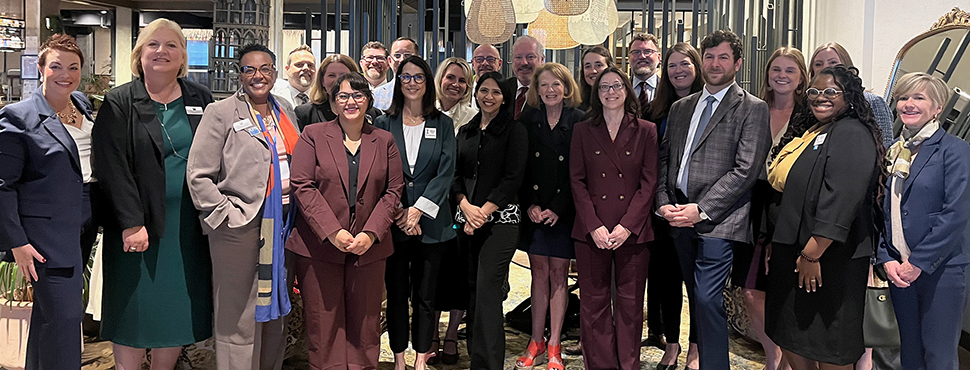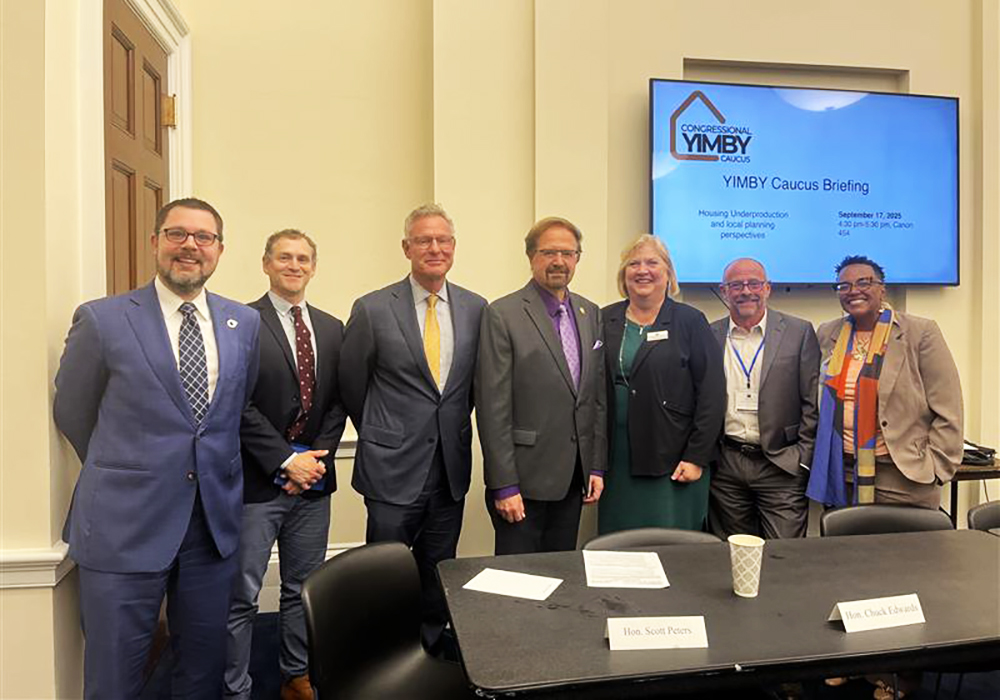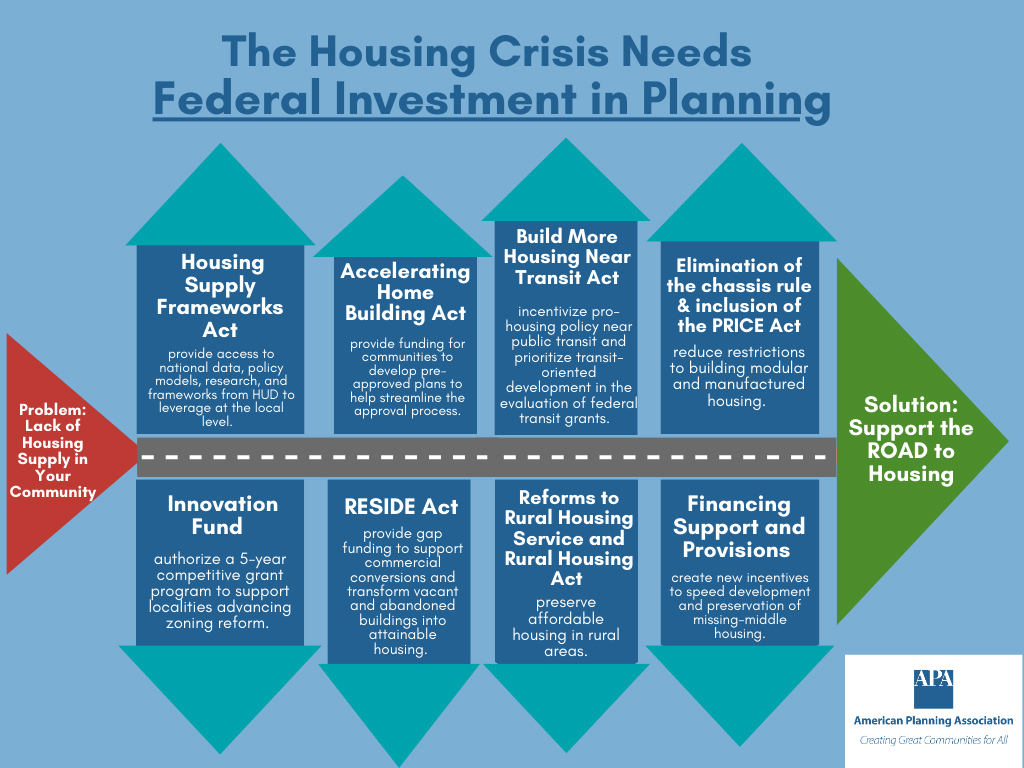Advocating for Housing Action on the Hill
In dozens of meetings, planners told legislators local stories and offered specific solutions to ease the crisis.

As Congress debates federal action on housing, advocates headed to Capitol Hill to ensure planners' voices are part of the conversation.
Armed with their community stories, on-the-ground insights, and professional expertise, planners let their representatives know in no uncertain terms: federal investment in planning and zoning reform is the path to solving the housing crisis. And with the appropriations process well underway and bipartisan legislation like the ROAD to Housing Act of 2025 on the table, now is the moment to secure it.
Advocates are on the Hill and ready to go! We look forward to speaking with members of Congress on federal support of local #zoningreform. #ItTakesAPlanner 🏘️🤩
— APA Advocates (@APAadvocates) September 17, 2025
Follow along👇 pic.twitter.com/WfundoSsnj
Different Communities, Same Challenges
Building on months of momentum created by Planners' Day, individual meetings, grassroots campaigns, and sustained relationship building, dedicated planning advocates from across the country held 74 Congressional meetings in Washington, including 16 meetings directly with legislators.
Senators and Representatives on both sides of the aisle were eager to hear from their constituents, "What's happening back home?" For each of the states represented, advocates had a similar answer:
"There's not enough housing, but it's really because there's not enough housing of the particular types that people really want to live in. So, there's not a good enough or large enough base of safe, decent housing in the rural areas."
— James Walden, AICP, Arkansas
"I think there's a lot of momentum for housing reform and for development... a lot of positive energy around housing production, [but] that is hard to do when there's outside market factors that are making housing production really difficult. There's some real challenges in terms of financing and constructing the projects"
— Laila Imihy, AICP, Minnesota

APA Past-President Angela D. Brooks, FAICP, meets with Illinois Congressman Mike Quigley to discuss how federal resources can support local housing efforts in Illinois and beyond.
In addition to sharing their community stories, advocates came ready to share actionable solutions their federal representatives can take at the national level. Specifically, opportunities such as the ROAD to Housing Act, which would support local zoning reforms to eliminate red tape and other barriers to housing, provide access to data, models, and best practices from HUD, and secure flexible funding for localities to leverage for their unique communities' needs are at the top of planners' policy priorities.
"The federal support that is really the most helpful is not preemption and not trying to do it for us or fix a problem, but providing the local planners with the financial support," said Managing Partner at Orion Planning + Design Allison Mouch, AICP. "We have the tools. We have the professional expertise. There's a lot of good work being done on the ground, but most communities... don't have the [staff capacity or] resources financially to develop a comprehensive plan or update their zoning."
"Big problems require a big response," said planning advocate James Walden from Arkansas. "What I think is most critical is giving more tools to planners, giving more tools to local governments to be able to address the issue. We can be a base for innovation, but we've got to have tools to be able to use it and do it."
Expert Insights Shape Solutions
While on the Hill, APA's own expert planners, Sue Schwartz, FAICP, John McCurdy, and Angela D. Brooks, FAICP, joined Representative Scott Peters (D-CA), Representative Chuck Edwards (R-NC), and Up For Growth for a YIMBY Caucus Briefing.
The briefing kicked off with a preview of Up For Growth's 2025 Housing Underproduction Report, which revealed that America is short a whopping 3.78 million homes. "Despite a record year for housing production in 2022, the number of permits issued has been on a downward trend since June 2022," explained Up For Growth's Policy Director David Garcia.
The report further cautions that despite an apparent improvement in the national housing supply, a decline in building permits and a reversal of migration trends suggest that this positive change is only temporary — federal action is needed to stymie a worsening housing shortage.
Led by Up For Growth CEO Mike Kingsella, panelists affirmed the struggles revealed in the Housing Underproduction Report, sharing the housing challenges their states are facing and opportunities for federal support to address them. Chief among those opportunities are supporting legislation like the groundbreaking bipartisan ROAD to Housing package, expanding financing for missing middle housing, and empowering more flexibility for localities to leverage federal resources.

YIMBY Caucus Brief panel (from left to right): Mike Kingsella (Up for Growth), David Garcia (Up for Growth), Rep. Scott Peters (CA-52), Rep. Chuck Edwards (NC-11), Sue Schwartz, FAICP (City of Greensboro, NC & APA President), John McCurdy (City of Rogers, AK), Angela Brooks, FAICP (City of Philadelphia, PA & APA Past President)
Congress Wants to Hear From Planners
Congressmen Peters and Edwards expressed their thanks to the panel for sharing on-the-ground insights and expertise. "I want to present the case for change and talk about the problems that we have with the guy who's trying to get a solution," said Edwards. Indeed, planners are eager to get to solutions for their communities — and federal action on housing is a necessary step.
First-time advocate Catherine McClure emphasized that federal legislation and funding would make a tangible difference for real people in Idaho Falls, Idaho:
"Just reading up on the ROAD [to Housing] Act and all of the pieces of it, pulling back some of the red tape on FHA requirements, pulling back the regulations for modular housing financing, that's going to be huge because we can have more options for financing for that prefab home. Then, also making more housing available for Veterans Affairs, our veterans, and getting more of our veterans into homes. So I think all of those pieces, what happens in DC, it really does touch the locals."

Planning advocates urged their representatives to support the ROAD to Housing Act, a package chock-full of resources, funding, and tools for planners to leverage for local housing solutions.
To the planners who may be on the fence about engaging with elected officials on housing and zoning reform issues at the federal, state, or even local levels, advocates had these words of advice:
"You're an expert in this. You have so much knowledge. And if you're working with legislators who are willing to say, I'm not the expert on it. It's such a beautiful space to be in with legislators who are maybe really passionate about housing reform and aren't 100% sure how to do that. You can be such a helpful and valuable resource to them."
–Laila Imihy, AICP
"I think one of the biggest reasons that planners should speak up is because if you don't, there may not be another voice that is advocating for the things that you are concerned about. You're not going to have somebody at the table who has the technical expertise. And so I would challenge folks, get off the sidelines. And I realize it can be scary, it can be difficult. It's new, it's different. But I think it is critically important... We have a role to play, and we have to be there.'
– James Walden, AICP
Stay Up To Date On Federal Action
PLANNERS' ADVOCACY NETWORK
Become a member of the Planners' Advocacy Network to stay up to date on federal action and receive opportunities on how you can get involved!


